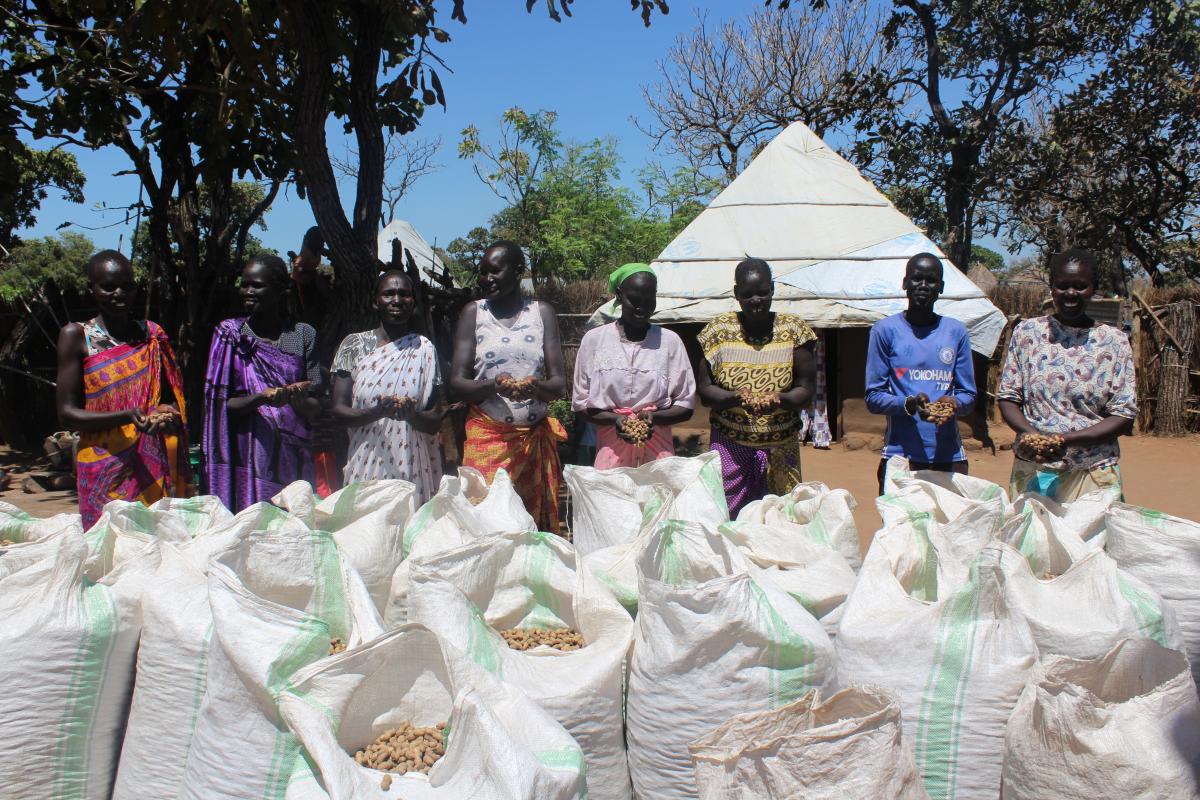A fivefold harvest excites refugee farmers
A group of women and a man stack groundnuts into 27 white
sisal sacks in the small compound. The groundnuts had been put out to dry – a
necessary stage in the post-harvest handling process that will prevent them from
being affected by mould while in storage.
This is the home of Akiit Deng Garang, a South Sudanese
refugee staying in Ayilo II refugee resettlement in Adjumani, Northern Uganda.
A widowed mother of six, Garang fled her home in South Sudan in 2014 due to war
and was resettled in Ayilo II. She is now the group leader of the farmers’
group that has harvested the 27 bags of groundnuts.
The group, which goes by the Dinka name Domwokok, comprises 26 members, only two of whom are men. Most of
the women are widows or living on their own in Uganda, their husbands having
stayed behind in South Sudan.
It partly explains why when the Danish Refugee
Council mobilised the Ayilo II community to form farmers’ groups that they
would work with on an agricultural programme, there was little hesitation in
this community.
“Working together in a group is good because it unites us,”
says Garang. “More importantly, it enables us to work for our families’ welfare
together. We support each other.”
Under the European Union Emergency Trust Fund’s Support
Programme for Refugee Settlements in Northern Uganda, the Danish Refugee
Council operates a livelihood programme aimed at enabling refugees and Ugandans
from the host communities to achieve home-based food security and income.
The Danish
Refugee Council does this through offering agricultural and financial literacy training
to communities as well as farm inputs that include seeds, hoes and pangas.
“After training us, Danish Refugee Council gave us five
sacks of groundnuts which we planted on a five-acre piece of land,” says
Garang. “We have now harvested 27 bags out of that, and we are very happy.”
Each refugee in Uganda is offered a small plot of land for
setting up a shelter and carrying out gardening. However, Domwokok group needed
a large piece of land, and they were lucky to get offered five acres, free of
charge, by a Ugandan landlord.
To enable refugees get land for agriculture, the
Danish Refugee Council reaches out to the local Ugandan community which owns
most of the land in the area and requests landlords to free up some land on
which the refugees can farm. Danish Refugee Council tries to make this
acceptable by involving the local Ugandan population in its activities,
something that helps to foster peaceful co-existence between the refugees and
their hosts.
So now that the harvest is in, what next for Domwokok group?
“We will sell off 17 bags and keep the rest for re-planting,” says Garang.
Having realised that groundnuts can withstand the largely dry weather in
Adjumani, the group hopes to capitalise on that and expand production.
Sticking to groundnuts may take away their worries about the
weather, but may not solve some of the other challenges the group faced in the
first season.
“The soil here is mostly rocky – it is hard, dry and not
fertile,” Garang explains. “It is also infested with termites which attack the
crops.”
Nevertheless, the group has a lot to look forward to. Groundnuts
are marketable in the region, as they are one of the staple foods. A 100kg sack
costs about UGX100,000 (USD28). In
addition, it is hoped that the group will become a supplier of groundnut seeds
to other farmers, as well as the Danish Refugee Council itself.
Domwokok Group is confident that they have the financial
skills to manage the proceeds from the sale of their current harvest as well as
those that will come in the future.
“We have received training in financial management, records
keeping and saving,” chips in Nyanyok Dupel, a member of the group.
The group
actually has a financial arm, too, in the form of a village savings and loans
association through which each group member saves some money per week. They
have so far saved UGX3,590,000 (USD997), which members are free to borrow and
return at a low interest.
The Danish Refugee Council works with 244 such groups in Adjumani district, made up of
both refugees and Ugandans. In Yumbe, another district hosting refugees, the
organization works with 234 groups.
Latest news from this project
No news

